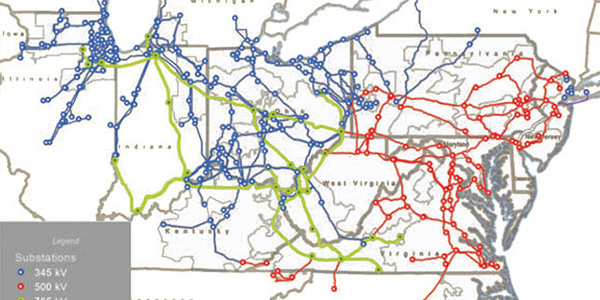By Rich Heidorn Jr. and Michael Yoder
FERC on Tuesday approved the PJM Transmission Owners’ critical infrastructure mitigation plan, the subject of several months of contentious debates over complaints that it lacks transparency and improperly restricts input by stakeholders and the RTO (ER20-841).
The TOs’ plan, which details a confidential process for removing critical transmission infrastructure from NERC’s critical infrastructure protection (CIP-014) list, became Attachment M-4 to the PJM Tariff, effective March 17. Attachment M-4 allows for consultation with PJM and the affected state commissions regarding CIP-014 Mitigation Projects, including discussion of siting issues and the estimated costs of a project, subject to confidentiality safeguards.
“The proposed revisions provide a just and reasonable approach to planning CIP-014 Mitigation Projects that appropriately balances the need to maintain strict confidentiality regarding the names, locations and vulnerabilities of CIP-014-2 facilities with stakeholders’ interests in transparency regarding the PJM Transmission Owners’ planning of these projects,” FERC said.
NERC requires TOs to protect CIP-014 assets, whose loss or sabotage could result in widespread instability, uncontrolled separation or cascading outages. Incumbent TOs say their proposal will harden these facilities — of which fewer than 20 exist within PJM’s footprint — and get them off the list, improving reliability for everyone. But other sectors remain in the dark about most of the plan’s details, including which assets are involved and how much it will cost.
Consumer advocates, industrial customers and state regulators asked FERC to reject the plan while trade groups WIRES and Edison Electric Institute called for approval. State consumer advocates were particularly upset that PJM endorsed the plan in a FERC filing despite a stakeholder resolution at the January Members Committee meeting arguing that the proposal conflicts with the RTO’s Operating Agreement. (See PJM Supports TO Critical Tx Plan.)
FERC disagreed, saying CIP-014 Mitigation Projects are a “a subset of Supplemental Projects and therefore are appropriately planned by the PJM Transmission Owners, rather than PJM.
“In interpreting the Operating Agreement, the question is not, as protestors argue, whether a CIP-014 Mitigation Project offers a reliability benefit by removing a facility from the CIP-014-2 critical facility list, but rather whether the project is required by PJM planning criteria,” the commission said. “PJM confirms, in its supporting comments, that there are no PJM planning criteria in the Operating Agreement that would allow PJM to plan CIP-014 Mitigation Projects through its RTEP [Regional Transmission Expansion Process] process, and therefore CIP-014 Mitigation Projects can be developed only as Supplemental Projects.
“Similarly, we disagree with protestors’ arguments that PJM should implement competitive bidding procedures for CIP-014 Mitigation Projects,” FERC added. “Supplemental Projects are not part of the RTEP process and thus are not part of the competitive window process.”
Cost Allocation, Transparency Provisions Upheld
The commission also rejected challenges to the cost allocation of M-4 projects as beyond the scope of the proceeding.
“Although protestors raise concerns regarding the potential for double-recovery, unjustified project costs and a lack of transparency regarding the prudency of costs incurred, we find that the currently effective cost recovery process provides sufficient safeguards against these concerns,” it said.
“We find that members of OPSI [Organization of PJM States Inc.] will receive sufficient information regarding the estimated costs related to CIP-014 Mitigation Projects. After submitting its preferred and potential solutions for a project to PJM, the Transmission Owner will seek a meeting with the relevant state commission(s). Upon completion of PJM’s review and assessment of the CIP-014 Mitigation Project ultimately selected for construction, the Transmission Owner will again seek to meet with the relevant state commission(s) to discuss … the efficiency and cost-effectiveness of any and all of PJM’s recommendations. …When public notice is provided regarding the existence of the CIP-014 Mitigation Project and cost recovery is sought, OPSI has the ability to submit a formal challenge regarding the prudency of costs associated with a CIP-014 Mitigation Project.”
FERC also rejected complaints that M-4 failed to comply with Order 890’s transparency provisions. “Order No. 890 allowed for flexibility in how the RTOs and transmission owning members meet these requirements for open, coordinated and transparent planning,” FERC said. “CIP-014 Mitigation Projects present unique concerns related to openness and transparency. The standard non-disclosure agreements upon which PJM and the PJM Transmission Owners typically rely to protect confidential information in the transmission planning process are insufficient for CIP-014 Mitigation Projects.”
Partial Dissent
FERC Commissioner Richard Glick dissented in part from the ruling, saying the mitigation projects should be planned by PJM and their costs regionally allocated because “by their very nature [they] have the potential to benefit the region as a whole.”
“In my view, the better course of action would have been for PJM to plan and allocate the costs of these projects regionally, but to create whatever procedural safeguards are appropriate in light of the need to keep these critical stations and substations confidential,” he continued.
Because the projects will be allocated only to customers in the zone in which each project is located, rather than in a manner commensurate with their benefits, Glick said, the proposal is unjust and discriminatory.
Glick cited a D.C. Circuit Court of Appeals ruling that “‘the commission generally may not single out a party for the full cost of a project, or even most of it, when the benefits of the project are diffuse.’ And yet that seems to be the most likely outcome of today’s order.”




